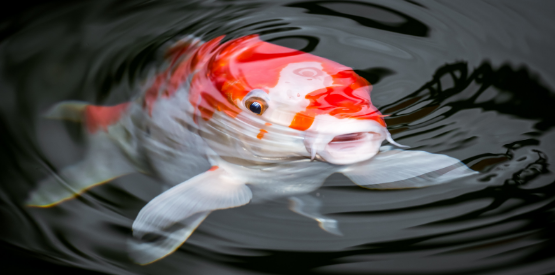Spotlight Fish: Pond Fish
A scenic pond or water garden makes a beautiful addition to a backyard, and can be even more rewarding with the addition of unique and vibrant pond fish. Pond fish will add an exciting dimension to your pond environment, and are generally tough, making them easy to keep with the proper care.

It’s important that your pond water conditions are conducive to keeping fish, and one way to determine this is by using a test kit – such as the API® POND MASTER TEST KIT – to measure water parameters, such as ammonia, phosphate, and nitrite, and then taking appropriate action to correct water conditions if any of these levels are too high. One quick and easy way to keep conditions safe for your fish is by using a water conditioner or treatment, such as API® POND AMMO LOCK, API® POND ACCU-CLEAR, or other products, to target and treat specific issues in your pond. This will aid in eliminating harmful ammonia and pollution that has built up in your pond without an immediate water change necessary to correct conditions. When changing your pond water, remember that water from the tap contains chlorine and chloramines, which are harmful to fish and to pond plants. You can treat new pond water with a tap water conditioner, such as API® POND STRESS COAT, to quickly eliminate these chemicals.
Equally critical to keeping pond fish is feeding them a high-quality food, which will aid in healthy digestion for your fish and contribute to the cleanliness of your pond over time. API® POND FISH FOOD provides all of the necessary nutrients for optimal growth and color vibrancy of your fish, and is highly palatable with ingredients such as marigold and garlic. Whichever type of API® food you select will provide fish with the necessary proteins and nutrients they need to stay healthy. How much your pond fish will eat depends upon the time of year, as outdoor fish eat less in colder months (only 2-3 times per week on average when the temperature drops below 60 degrees Fahrenheit) and more frequently in warmer months. This is largely due to the rate at which your fish digest food in different temperatures.
During the winter, your fish will “hibernate” at the very bottom of the pond to keep warm, usually in groups. Since pond fish like Koi and Goldfish are cold-blooded, their bodies adapt to changes in weather, and they won’t die in extreme temperatures provided that the pond is deep enough that water doesn’t freeze to the bottom. Keep a hole open with a bubbler or heater to allow oxygen exchange for these types of ponds. If you have a shallow pond, your fish will need to be kept indoors for the winter.
If your fish will remain in your pond throughout the winter, you should keep a small pocket free of ice to allow toxic gases to escape from water, keeping the environment healthy for your fish. Do not break the ice at any point – doing so can create shock waves that are harmful or fatal to your pond fish. You can use a heater or floating pond de-icer to keep your pond from freezing solid, which should allow fish to get the proper aeration in the winter.
Pond fish – Koi, Goldfish, and others – are generally versatile and hardy, and will make a great addition to an ornamental pond or water garden.
